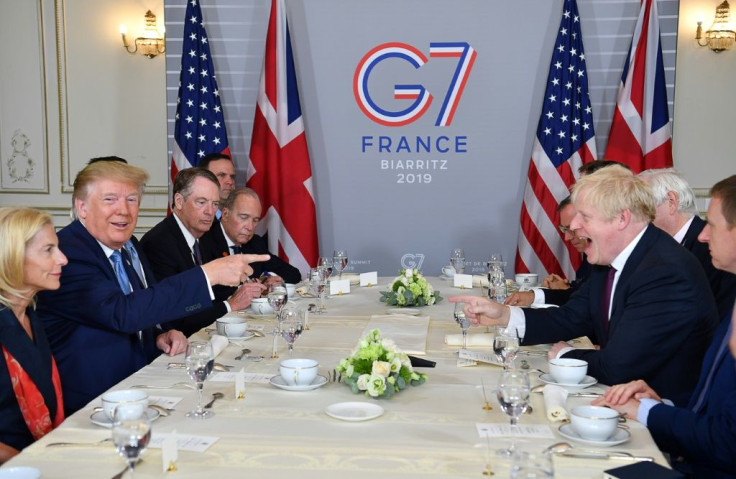Brexit News: Boris Johnson Wants Trump To Soften On China Trade War, As UK Readies To Leave EU

As the G7 summit convenes in Biarritz, France, British Prime Minister Boris Johnson publicly stated that he wants U.S. President Donald Trump to soften on his trade war with China.
"Clearly the state of global trade, I'm very worried about the way it's going. The growth of protectionism, of tariffs, that we're seeing" Johnson said. "There are all sorts of people, who will take any excuse at all to interfere with free trade and to frustrate trade deals, and I don't want to see that."
When asked by journalists if this means that he would ask Trump not to escalate the trade war, Johnson replied, "you bet."
Trump has made conflicting comments on his trade policies at the summit, saying, "I have second thoughts about everything," while also saying he wished to raise tariffs on China even higher.
"His answer has been greatly misinterpreted,” White House spokeswoman Stephanie Grisham wrote in a statement.
Trump's economic adviser Larry Kudlow appeared Sunday on CNN's "State of the Union" to clear up the confusion.
"He didn't exactly hear the question," Kudlow said. "Actually, what he was intending to say is he always has second thoughts and actually had second thoughts about possibly a higher tariff response to China."
Trump on Friday posted tweeted that he wants to boost tariffs on $550 billion in Chinese imports in retaliation for China hiking trade levies on $75 billion in U.S. goods.
Johnson may be trying to mitigate the economic upheaval the country might endure in the coming months. On Oct. 31, Johnson plans for his country to leave the EU, with or without a deal. Some analysts fear a no-deal Brexit can push the U.K. economy into a recession.
More tariffs and trade spats might put pressure on U.K. firms. In 2017, China accounted for 3.6% of U.K. exports and 7% of U.K. imports.
The U.K. is also concerned with how the trade war impacts its European neighbors, as Germany is edging near a recession.
Although the U.K. is leaving the EU, Johnson hopes to strike up a trade deal with the United States. Trump told Johnson at the G7 meeting that he "wants a very big trade deal with the U.K."
U.S. lawmakers may thwart these plans, as they are concerned that Brexit could impact the 1998 Good Friday Agreement, which established Northern Ireland as part of the U.K.
Trump and Johnson have long shared a close political bond, with Trump saying that he was "very very happy" when Johnson became prime minister earlier this summer.
But the two leaders also have some diverging viewpoints, as Johnson supports the Iranian nuclear deal, which Trump pulled the U.S. out of. Johnson also doesn't want to block all Chinese Huawei equipment in the U.K., which the White House supports.
© Copyright IBTimes 2025. All rights reserved.





















